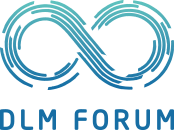DLM Forum upcoming webinars this autumn
This autumn the DLM Forum will organise the following webinars (click to scroll)
September 15th - "DiAGRAM: the Digital Archiving Graphical Risk Assessment Model"
September 29th - “E-ARK and eArchiving – Your questions answered” - slides and video now available!
October 21st - “Preservation of Corona-evidence at the Danish National Archives”
Webinars are open to DLM Forum community members.
Video presentations and slides for all webinars are now available here.
"DiAGRAM: the Digital Archiving Graphical Risk Assessment Model," Alex Green, Hannah Merwood, and David Underdown from the UK National Archives, 15th September at 14:00 (CEST).
The UK National Archives has been leading a collaborative project with five other English archives, and statisticians from the University of Warwick’s Applied Statistics & Risk Unit, to develop DiAGRAM: the Digital Archiving Graphical Risk Assessment Model.
DiAGRAM’s foundation is a Bayesian Network – a statistical model that estimates the probability of outcomes by considering conditional events and changes over time (e.g. the lifespan of our archival storage depends on a changing mix of storage media types). In this presentation we will give a background to the project, a brief overview of the method1ology and demonstrate how the tool can be used in practice to inform preservation policy decisions.
Registrations closed. Back to top
“E-ARK and eArchiving – Your questions answered,” Jaime Kaminski, Highbury IVS, Diogo Proença, University of Lisbon et al., 29th September at 14 (CET).
The webinar introduces the E-ARK project and its outputs: What problems does it solve, how does it solve them, and does the approach meet the needs of the user? What is the added value for the digital community and the expected benefit?
Registrations closed. Back to top
“Preservation of Corona-evidence at the Danish National Archives,” Jette Holmstrøm Kjellberg, the Danish National Archives, 21st October at 14 (CET).
The Danish National Archives quickly began collecting documentation of the corona crisis when the country was closed down in March 2020. The contributions have mainly been citizens' photos of home workplaces, social distance, face masks in public transport, etc. They are now starting a new phase, where they collect documentation from the whole community in a more structured way: private companies, organisations, public authorities and research archives.
Jette H. Kjellberg is an archivist at The Danish National Archives working with the acquisition of archival data. She is the project manager of the preservation of Corona-evidence at the Danish National Archives. She will talk about the contributions, how the National Archives has organised the collection and about the considerations that have been made about how to collect documentation of an event while it takes place.
Registrations closed. Back to top
“Computing Cholera: Topic modelling the catalogue entries of the General Board of Health,” Chris Day, the National Archives of the UK, 12th November at 14 (CET).
Large scale digitisation and the emergence of growing volumes of born-digital records have increasingly pushed archive professionals, researchers and the public to approach digital and digitised archives in new, computational ways. This webinar will introduce us to a method that helps us to get a comprehensive and quick overview of the content of vast datasets – a method referred to as “topic modelling,” a way of “distant reading.” In topic modelling, computers use statistical calculations to place texts into subject groupings, or topics.
The UK National Archives has adopted this method in examining the catalogue descriptions of The UK National Archives record series MH 13: General Board of Health and Home Office, Local Government Act Office: Correspondence, a mid-19th century public health body, for which detailed descriptions of some 89, 000 items of correspondence have been created.
Registrations closed. Back to top
“Practical applications and possibilities for artificial intelligence based natural language processing in today’s enterprise document processing environment using the example of A.N.I.T.A (Artificial Neural-Intelligence Translator Assistant),” Tamás Frisch, Stratis Kft., Hungary, 25th November at 14 (CET).
About the webinar: We can't escape the phenomenon of artificial intelligence (and especially, its alleged bright future) in our everyday life. From our new phone making Photoshop obsolete to our next self-driving car to the jobs we will apparently lose in a few years to a robot, it seems to be a prevalent power not to be missed if we want to survive. At a closer look, however, there are very few examples where AI has effectively been put into production in an enterprise environment.
In this webinar, we will review the theoretical applicability of artificial intelligence techniques in the field of natural language processing (NLP) for large scale document processing, outlining the bright future first. At the same time, based on the implementation experience with Stratis' NLP-based product A.N.I.T.A at the Hungarian Police and other public agencies, we will also share the do's and dont's of leveraging artificial intelligence in document management projects, as well as our take on the applicability of all those fancy technologies today or tomorrow.
Registrations closed. Back to top





